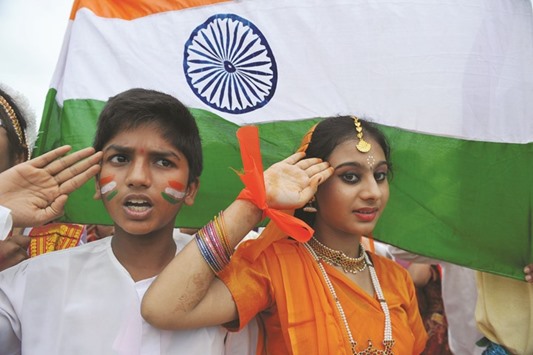All cinemas must play the national anthem before screening movies and audiences should stand for it, the Supreme Court ruled yesterday, drawing angry accusations of an assault on civil liberties.
A court panel said cinemas should display the national flag on the screen as the anthem was played, and that making people stand up would instil a sense of patriotism.
“The national anthem has to be played in cinema halls before the feature film is played with the national flag displayed on the screen,” said Abhinav Shrivastava, the lawyer for the private plaintiff in the case.
Many cinemas already play the national anthem before screenings, but only Maharashtra has made it mandatory to do so, and the issue of whether audiences should be made to stand has long been the subject of debate.
“When the national anthem is played it is imperative for everyone to show honour and respect,” the judges said, according to the Livelaw news website, a comment Indian media said meant audiences should stand.
Playing the national anthem “would instil a sense of committed patriotism and nationalism”, they said.
While the anthem is on, all theatre exits will be closed, the court said.
It was mandatory for cinemas in India to play the national anthem after the movies in the 1960s, but the practice faded away in most states.
Referring to Article 51 of the Constitution regarding the fundamental duties of citizens, the court said: “...it is the sacred obligation of every citizen to abide by the ideals engrafted in the Constitution. And one such ideal is to show respect for the national anthem and the national flag.
“The citizens must realise that they live in a nation and are duty bound to show respect to national anthem which is the symbol of the constitutional patriotism and inherent national quality.”
The court prohibited commercial exploitation of the national anthem.
“There shall be no commercial exploitation to give financial advantage or any kind of benefit,” the court said.
It barred any dramatisation of the anthem or its inclusion as a part of any variety show.
“To think of a dramatised exhibition of the national anthem is absolutely inconceivable.”
The court also ordered that the national anthem or part of it should not be printed or displayed in a manner or at places “which may be disgraceful to its status and tantamount to disrespect”.
The ruling drew sharp criticism, with many saying it was a violation of civil liberties.
“It is bad enough for the Supreme Court to scorn individual freedom. To do so on an issue as unserious and arbitrary as what should be done at cinema halls is terrible,” Nitin Pai, founder of the Takshashila Institution think-tank, wrote in a blog post.
The issue has long been controversial in India, where some liberals say freedom of speech is being stifled by the federal Bharatiya Janata Party government .
Last month a disabled man described how he was attacked in a cinema in Goa for failing to stand for the anthem.
And in January a Bollywood scriptwriter was heckled inside a cinema in Mumbai after he refused to stand for the song.
Domestic media last year reported that a Muslim couple were thrown out of a cinema last year for not standing for the anthem.
C Kalyan, vice president of the Film Federation of India, said producers favoured the ruling as it would end the confusion.
“We played it in some states, but now the court ruling is clear,” Kalyan said.
Shekhar Kapur, the filmmaker behind Elizabeth and Bandit Queen, said he hoped the court would also order the parliament to sing the national anthem.
“Often its drama too is movie-like,” he tweeted.

(FILES) In this photograph taken on August 30, 2012, Indian school children salute as they stand to attention and sing the national anthem ‘Jana Gana Mana’ in Hyderabad. All cinemas must play the national anthem before screening movies and audiences should stand for it, India’s highest court ruled November 30, 2016, drawing angry accusations of an assault on civil liberties.
